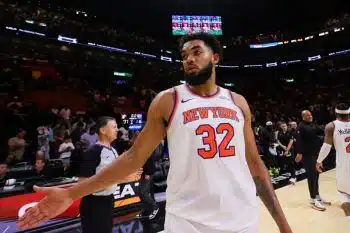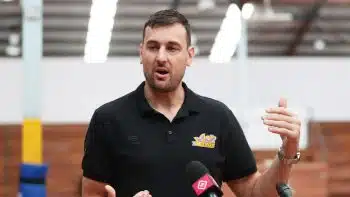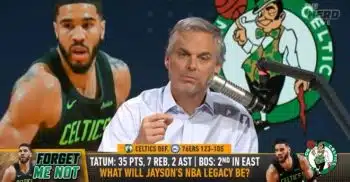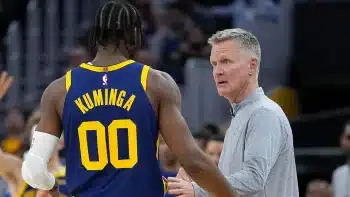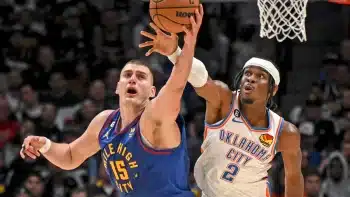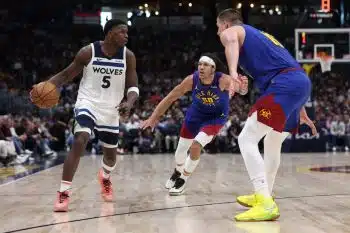NBA
NBA Daily: Fixing The New Orleans Pelicans
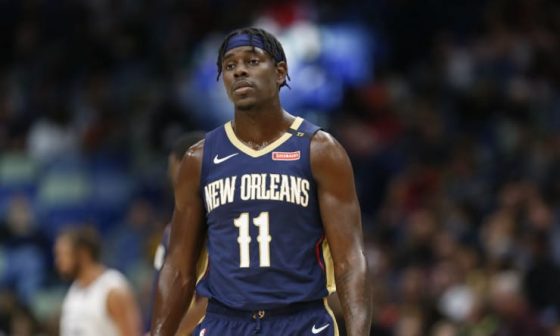
As franchises have been eliminated from postseason contention, Basketball Insiders started to diagnose their ailments and offer future plans of attack.
Unfortunately, it may take a whole lot more than that to fix the New Orleans Pelicans.
The Pelicans, who now find themselves in a unique circle of basketball misfortune, had a frustratingly inconsistent campaign further nosedived by a mid-season trade request from their superstar. After two weeks of will-they, won’t-they rumors with the Los Angeles Lakers, Anthony Davis was not moved at the deadline, ensuring that he’d awkwardly stay put until the summertime at the very least.
On top of Davis jumping in and out of the lineup post-All-Star break, Jrue Holiday recently underwent season-ending surgery, while Elfrid Payton and E’Twaun Moore have struggled to stay healthy all year as well.
Oh, and the Pelicans’ third-best asset is expected to hit unrestricted free agency to boot. So, without sounding too hyperbolic, this may just be the most important offseason in franchise history.
What Is Working?
All things considered, employing Anthony Davis was working out pretty well.
In 2017-18, the Pelicans won 48 games, Davis and Holiday were praised as defensive forces — and awarded as such — and then they went and swept the Portland Trail Blazers in the first round. Since then, anything that could go wrong has.
Davis, despite the media circus surrounding him since January, has tallied 25.9 points, 12 rebounds and 2.4 blocks per game. Before his abdominal strain, Holiday was averaging 21.2 points, 5.1 rebounds, 7.7 assists and 1.6 steals on 47.2 percent from the floor. Even in the tough Western Conference, that’s a stellar way to kick off any competitive rotation. Plus their shrewd addition of Julius Randle — a career-best 21.2 points and 8.6 rebounds this season — gave the Pelicans plenty of worthy offensive pieces.
In fact, even today, New Orleans’ scoring acumen is not in question.
The Pelicans rank first in points in the paint (58.4), third in points per game (115.5), pace (103.9) and 11th in offensive rating (110.8). Simply put, those numbers are far too good for a team currently 13 games under .500.
And although the Pelicans aren’t often hailed for their development, they’ve succeeded with a small number of young assets. Christian Wood, picked up off the scrap heap this month, has averaged 18.3 points and 6.3 rebounds in his first three games with New Orleans — a keeper, in all likelihood. Jahlil Okafor — yes, that Okafor — has played well when given the opportunity and Frank Jackson remains promising at the age of 20. Still, Kenrich Williams, an undrafted free agent, has been the pièce de résistance.
Williams, 24, has been a much-welcomed boost to the rotation, even grabbing some extremely positive praise from Holiday in the process:
“A star, really. [Williams is] someone who can come out and fill up the stat sheet. Offensive rebounds, defensive rebounds . . . he can lock up your best player.”
Even if the Pelicans have to go full rebuild this offseason, they’ll be starting with at least Holiday and Williams — there are far worse fates to hold.
What Needs To Change?
Before hopping into the Davis-related debacle ahead, there are four other quick-hitter topics that the Pelicans must tackle this offseason:
1. Defense
Since Davis was drafted No. 1 overall, the Pelicans, surprisingly, have been a pretty poor overall team defensively — but, as of late, they had begun to turn the corner.
In chronological order from 2012, Davis’ rookie year, here’s New Orleans’ defensive rating by season: 28th, 27th, 23rd, 26th, 9th and 14th. Unfortunately, this season, that rating is back in the dumpster at 111.7 — good for 23rd-worst. Whether or not Davis sticks around, the Pelicans must focus on adding defensive-minded players in both the draft and free agency. In the Western Conference, they’ll continue to toil in mediocrity without an average unit to combat that great previously-mentioned offense of theirs.
2. Health
Of course, at the end of the day, this is hardly New Orleans’ fault.
But, to date, ahem, here’s how things shook out for the Pelicans on the missed games front:
Davis has been withheld from 21 games, followed on the superstar front by Holiday at 10. Trailing that dynamic duo, Elfrid Payton, freshly signed, has lost 40 games to injury, while E’Twaun Moore lost 24. Even the blossoming Randle sat for seven games himself. Before he was traded to Milwaukee at the trade deadline, the chronically-injured Nikola Mirotic — and the team’s most reliable stretch four option — had missed 23 games.
Perhaps next year, the basketball gods won’t frown upon the Pelicans so harshly — fingers crossed.
3. Three-Point Shooting
Speaking of long-range efforts, New Orleans finds themselves cemented firmly in the basement here as well.
This campaign, the Pelicans have connected on just 10.2 three-pointers per game at a 34.4 percent clip, numbers that rank them 22nd and 25th in the NBA. New Orleans’ lone player to average over two three-pointers per game, Mirotic at 2.7, was traded last month. Darius Miller has posted back-to-back strong seasons from deep, but that’s practically all he offers on the offensive end.
Holiday has hit a career-best 1.8 three-pointers per game on a career-low 32.5 percent, which basically sums this all up. Moore is an above average shooter — 43.2 percent in 2018-19 — but his injuries have kept him from contributing to that nightly total. Of the eight teams that have made fewer three-pointers per game than New Orleans, only three of them will reach the postseason — the Spurs, Clippers and Pacers.
On the flip side, that trio of teams also convert at the first-, second- and fifth-highest percentages from deep this season, respectively — so, basically, a monumental trade-off that the Pelicans just cannot match in either direction. The modern landscape dictates a need for multiple high-volume or high-percentage three-point shooters and New Orleans barely claims one at this point in time.
4. Depth
Then there’s the lingering depth issue that has plagued New Orleans time and time again. Remember the Pelicans’ second-best points per game number? The starters have accounted for 82.3 of their 115.5 points, or, in other words, a whopping 71.2 percent of their per game total. Presently, New Orleans’ bench notches the seventh-lowest average in 2018-19 so far, which isn’t inherently a problem as Milwaukee, Philadelphia, Golden State, Oklahoma City, etc, all thrive without one.
But those bottom-ranking bench squads typically boast multiple future Hall of Famers or elite defensive units to help counterbalance that effect — something, again, that New Orleans certainly lacks. When Davis is dealt, the Pelicans must round out the rotation and find the depth they’ve been missing.
The Anthony Davis Part
At long last, here’s the most simple, crucial and difficult portion of New Orleans’ entire offseason: Moving on from Davis.
It’s hard to believe that the Pelicans’ franchise leader in points, rebounds and blocks is the major piece that needs to change this summer — but the last few months have been anything but normal in the Big Easy.
Davis’ late January request to be traded — to his credit, he’s been willing to continue playing — fractured a unique, unhealable bond. Rehashing the numerous public negotiations made with Los Angeles now seems fruitless — now his departure is not a matter of if, but when.
Disastrously, since the trade deadline, the situation has somehow become even trickier. Brandon Ingram, the Lakers’ best and leading asset in their offers, was diagnosed with deep venous thrombosis and underwent season-ending surgery. Lonzo Ball, talented as he may be, has been shut down due to lingering injuries in both of his professional campaigns so far.
If the Pelicans held out in hopes of Jayson Tatum’s eventual availability, that itself is far from guaranteed with so much hanging on Kyrie Irving’s upcoming trip to free agency. Should the Lakers’ offer look less intriguing than it once did, that leaves immense pressure to broker a deal with Boston. But given general manager Danny Ainge’s usual stinginess, the Celtics will definitely flinch at moving a trove of assets for a potential one-year rental — especially one that has all but confirmed he wants to team up with LeBron James.
The threat of Davis leaving in 2020 for Los Angeles will dampen every single trade offer that New Orleans receives this summer — a real Sophie’s Choice of bland blockbuster returns. As always, the Pelicans could force Davis to sit out the remainder of his contract but losing their once-in-a-generation star for nothing would be a massive blow to one of the already lowest-attended franchises in the league.
When Davis is inevitably traded this summer, they’ll hope to recoup even half of his value — a goal that seems lofty as of now — but even snagging a few quality pieces like Kyle Kuzma or Jaylen Brown and a future draft pick remain an absolute must.
Focus Area: Free Agency
Outside of the Davis hubbub, the currently general manager-less Pelicans will have loads of decisions to make in July.
Of note, Holiday is locked into a deal valued at about $26 million until at least 2020-21 and Solomon Hill has one more season left at a hefty $13.2 million. But other than that, the Pelicans will have some money to spend if they’d like to.
The ever-blossoming Randle can opt out and become an unrestricted free agent — so when Davis goes, throwing near-max money at the power forward would be a suitable option. If losing the franchise cornerstone seems unavoidable, New Orleans might already have their everyday usage replacement on the roster.
Elsewhere, the perpetually confounding Stanley Johnson, has labored since his arrival in February — but can the Pelicans really afford to let a cheap lottery selection leave in RFA? Okafor has an intriguing team option at just $1.7 million but he hasn’t played 25-plus minutes in a game since early last month.
Presumably, Christian Wood, Kenrich Williams and Frank Jackson will all return for another season on reasonable, cost-effective deals.
Nevertheless, the case of Elfrid Payton is sure to give the new general manager some restless nights as an added bonus. On a one-year deal at $3 million, he’s spent most of the season dealing with various ailments… but when Payton takes the floor, he’s been mostly excellent. The point guard’s 5.4 rebounds and 7.4 assists per game are career-highs and he recently posted five-straight triple-doubles — yup, that’s not a typo. In doing so, Payton joined Russell Westbrook, Oscar Robertson, Michael Jordan and Wilt Chamberlain as the only players in NBA history to log such a feat.
That’s not bad company to keep heading into free agency.
Frankly, Davis’ exodus will likely cause a full rebuild around Holiday so the Pelicans should avoid any messy, quick-fix deals this offseason. But here’s the rub, a foundation of Holiday, Williams, Wood, Jackson (plus potentially Randle and/or Payton), their rising 2019 first-rounder and whatever they pry away in a presumed Davis deal would be far from a nightmare start to this multi-year operation.
Focus Area: The Draft
Considering that aforementioned leaping off point, New Orleans should just select the best player available in June. At 32-45, the Pelicans hold basketball’s ninth-worst record and a 20.3 percent chance of jumping into the top four during the NBA Draft Lottery. With five games remaining, they also have decent odds of skipping past Washington and Memphis for slightly more ping pong balls — but, all that said, the Pelicans will add a quality asset no matter where they pick.
Bruno Fernando, who averaged 13.6 points, 10.6 rebounds and 1.9 blocks per game for Maryland this year, could be a solid rim-protecting asset to pair in the frontcourt with a re-signed Randle. Inversely, versatile prospects like Rui Hachimura or De’Andre Hunter would shore up New Orleans’ perimeter defense if that’s the path they choose to head down.
Or, if they wanted to pair Holiday with Jarrett Culver — the outstanding sophomore that currently has No. 3-seeded Texas Tech in the Elite Eight — that’d be a selection worth celebrating. Assuming that New Orleans is above to dive headlong into their next era, their decision remains looming. Sure, any incoming Davis package would influence these proceedings — e.g., drafting a power forward if the Celtics finally pony up Tatum would be silly — but it’s far too early to tell on that front.
However, the Pelicans could kill two birds with one stone by adding a defensive-oriented three-point shooter. Today, the aforementioned Hunter fits that bill to a tee.
Given their current state of affairs, predicting anything Pelicans-related may amount to a fool’s errand — as of now, we’re all just waiting for the first domino to fall. The future direction of this franchise — from their role in free agency to their draft day targets — will depend on how the Davis situation unfolds. But since any Celtics-centered deal theoretically hinges on Irving’s return to Boston, this saga could very well bleed into July.
Big money moves aside, New Orleans’ front office has been tasked with some weighty decisions this summertime — ultimately, choosing the right ones will shape this organization for years to come.
